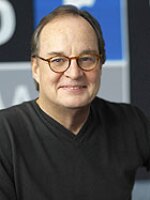ALEX CHADWICK, host:
I'm Alex Chadwick. First, our lead story more on gas prices. Members of OPEC, the cartel of oil rich nations are in Venezuela for a one day meeting. No one expects them there to do anything that is going to cost you any more. But the conference host sure wants them to. He's Venezuela's President Hugo Chavez. NPR's Lourdes Garcia-Navarro is at the meeting.
LOURDES GARCIA-NAVARRO reporting:
What is interesting about this meeting is, first of all, where it's being held in Caracas, Venezuela, and who is hosting it, Venezuelan President Hugo Chavez. Chavez is a price hawk and he, unlike most of the cartel members who are Middle Eastern, is basically asking the cartel to lower its output of oil so that prices will go up. And he wants to maximize his profit at a time of record oil prices. That's unlikely to pass. You know, Arab countries are cashing in on rising demand from places like China, and oil prices are almost at $75 a barrel, and they don't feel any need to change that at the moment. And also it would be a tough sell to consumer nations like United States, saying, you know, hey, we're going to cut production at a time when oil is at record highs.
CHADWICK: Did Hugo Chavez, is President Chavez the person who called this meeting or is this a regularly scheduled OPEC event?
GARCIA-NAVARRO: Well, OPEC meets regularly. They're going to be having another meeting in September. Venezuela is actually one of the founding members of OPEC when it was created in 1960. It was actually a Venezuelan idea to have a cartel of oil producing nations so that prices would be stabilized. But you know, all politics, as you know, is local, and while oil is a global issue at the moment, you know, President Chavez is definitely using this because he has an agenda regionally. He's asking for Ecuador and Bolivia to be included in OPEC, and he's also pushing for basically nationalizing the oil industry in Latin America. That's a message they're pushing in Bolivia, where they've nationalized their gas, their natural gas companies, and a message that they're pushing also in Ecuador. So you know, this is basically a regional platform for President Hugo Chavez to push his message.
CHADWICK: How is he regarded within OPEC? You say the organization is probably not going to go along with this proposal but what sort of a figure do they see him?
GARCIA-NAVARRO: Well, I think him as many people do, you know, as kind of a maverick figure. You know, there's very different agendas here. I mean you have countries in the Middle East, you know, the situation there is very different there from the situation here. You know, when it comes to Venezuela, Hugo Chavez, like I said, wants to stand on the global stage, thumb his nose at the United States, which is his favorite thing to do. He's definitely an ally of Iran and has said so very, very openly. But there's a lot of regional politics going on.
CHADWICK: NPR's Lourdes Garcia-Navarro in Caracas. Lourdes, thank you.
GARCIA-NAVARRO: You're welcome. Transcript provided by NPR, Copyright NPR.







